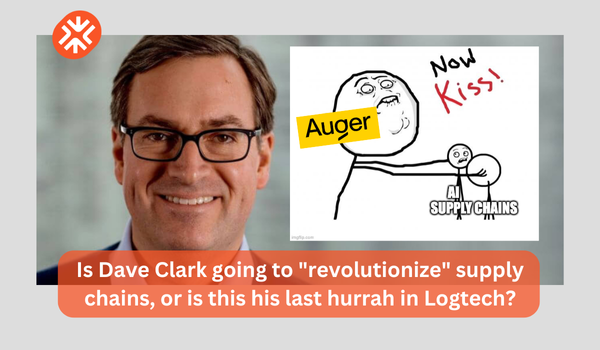Domestic Freight in North America, and what else?

US landside logistics is the next big thing on integrated logistics execution platform CargoWise's agenda. With cash in the bank and a highly successful international freight forwarding platform, they've chosen the M&A highway for fast access, and expected big returns. But with "an arrow that points directly to the US domestic market", is WiseTech CEO trying to put everyone off the scent of what they are really doing?
Why the US domestic freight market now?
The US domestic freight market is that big unknown for WiseTech. Different kettle of fish from their existing international freight forwarding solution. So why go there now, when the company still has a number of potential global rollouts to chase, and a global customs compliance solution to work on and launch?
The international freight forwarding space is changing, and WiseTech needs to hedge.
International freight forwarding hasn’t really changed all that much in the last twenty years. This is the kind of message the new era of logistics technology founders would like to have you believe. It fits with their “freight forwarding is archaic and forwarders don’t even know how to switch-on a computer” narrative. The reality is much more evolutive. International freight forwarding has evolved greatly, both regarding processes and logistics technology.
WiseTech Global has been one of the drivers of this change. There is nothing wrong with asking yourself if the likes of DSV would ever have made it to where they are today without the CargoWise solution. And that is ok. We need great software solutions to drive the industry forward. Contrary to popular belief, software in our space doesn’t yet replace people, and I doubt that ,even with the arrival of AI, it will have that kind of impact anytime soon.
What we need to understand is that CargoWise has a privileged vantage point from where they can observe industry happenings and trends. They know how well their customers are doing, and who is struggling. They also know just how hard they can push their customers when it comes to pricing. In the March 17 2023 JOC article by Eric Johnson (seriously if you don’t already, go and follow Eric on LinkedIn), Richard White, WiseTech Global Founder and CEO said that “For 28 years, I’ve never had a customer compliment me on pricing”. But the attrition rate remains low, and top 3PLs are not moving off the platform (yet).
However…
It is starting to look likely that CargoWise has reached a plateau in its current form. There is only so much CargoWise can add to the freight forwarding component without having to completely rebuild the product, which is rather old-school to say the least.
And as for pricing, although Richard has addressed these questions and admitted that CargoWise is “not cheap software”, he also knows that there is only so much more they can add on the existing license fee and transaction cost. Especially as freight forwarding margins are emulating Freightos’ stock price since the IPO, hovering at dangerously low levels. Seeing as WiseTech have relied on increasing pricing as a lever to maintain their 30% growth rate, it all seems quite fragile.
US domestic freight play is also about timing
Logistics technology valuations are not as healthy as they once were. This is both due to the lack of preparedness from logistics companies after gorging themselves on inflated rates and a struggling global ecosystem. You could also add that the lack of value and any meaningful growth numbers during this period from the likes of project44, freightos, Flexport, and others, hasn’t helped logtech valuations overall.
WiseTech is flush with cash, but they are also not impartial to a bargain. That seems like what they sought when going after Shipamax. They managed to get Envase at a price point that was quite the haircut on the previous valuations. It wouldn’t come as a surprise if the Blume deal is very earnout and stock heavy. If valuations were where they were in early 2022, they would not have managed to pull this off.
And there is more to come. Blume, Envase, and Trinium are simply insufficient for them to put together their full US landside offer. They’ll want to continue to capitalize on the low valuations and the growing pain in the industry to get some more deals done. Obvious candidates are US domestic freight data providers such as p44 and Fourkites. Although the former will want over a billion dollars which is unrealistic, and the latter seems to be in a good enough position to go it alone and potentially disrupt the visibility scene in the future.
Richard did mention to Eric that they could be looking for a “US domestic transportation play”. I’m not sure how I feel about that one. WiseTech should have built a land transport product by now, and the fact that they haven’t got anything worth its price in that space is scary. Do they have what it takes to expand into the great unknown that is US domestic forwarding?
US domestic freight sure, but what happened to global customs?
WiseTech have set their sights on the US domestic freight market now, and hope to emulate their global freight forwarding success. Having read recent interviews including Richard White, you’d be forgiven for forgetting that before Blume and Envase came a wave on customs and compliance M&A that the likes of Magaya are talking about emulating today.
So what did happen to WiseTech’s global customs plans and why has US landside logistics superseded them?
In the words of Jesse J: “it’s all about the money money.”
Simply put, the global customs plan is a short-term failure, and a long-term uncertainty. The more attention that they can take away from the customs and compliance area, the better. Between slow, and even in some cases seemingly failing customs integrations, and a lack of a real global product, things aren’t as sexy as they’d wish. Add to that the fact that the customs and compliance teams at WiseTech are said, by Richard himself, to represent nearly half of the company’s total product resources.
If WiseTech had continued down this path, without exploring landside logistics in 2023, they’d face increasing scrutiny at the next earnings call, and potentially more after that. As the customs integrations drag on, and key countries such as Brazil and Germany keep eluding native integration, it appears that this is a real slow burner. Enrolling the likes of Kuehne + Nagel as an “early adopter” for a global rollout is a great PR move, but frictions will start to show fairly quickly if WiseTech doesn’t pick things up and deliver.
If done right, global customs could be much more than a module for global freight forwarders.
The future of freight forwarding is an interesting topic. The likes of WiseTech have probably drawn similar conclusions to those mentioned early-on in this article, and are hedging their bets. From global 3PLs to US domestic freight, that is a smart move with plenty of overlap. But even if they were to continue with the different pillars laid out during the annual results presentation, meaning improving their warehouse offering, there will be only so much they can squeeze out of an increasingly cost conscious industry.
Which brings us to the BCOs.
Through various acquisitions, especially in the customs space, it is highly likely that WiseTech have acquired BCO customers. And that is ok, as long as they are smart with how they build things, and do not compete with their 3PL customer base, they can start looking to BCOs for more revenue. And what better product to do this with than a global customs and compliance solution that is fully standalone?
In conclusion, WiseTech are clearly spending big and being bold, as they know that they’ve set high expectations. The moment their 30% growth starts to dip, and they lose their first global 3PL customer, everything will change, and quickly. They are taking risks in diversifying yes, but with global customs seemingly bogged-down and taking longer than expected, they have no choice.
I'm Anthony, ex-WiseTech'er and Logistics Technology nerd.
You can find me on LinkedIn: https://www.linkedin.com/in/anthonymlr/
And I may start using Twitter if Elon doesn't kill it first: https://twitter.com/Anthonymlr1
My opinions are my own, although I'm sometimes told they are shared by many, yet voiced by few.
My goal is to make Logistics Technology a healthier place and to provide everyone with the kind of information they need to decrypt this magical and mad industry we either love or hate depending on the day and if someone has blocked the Suez Canal again.





